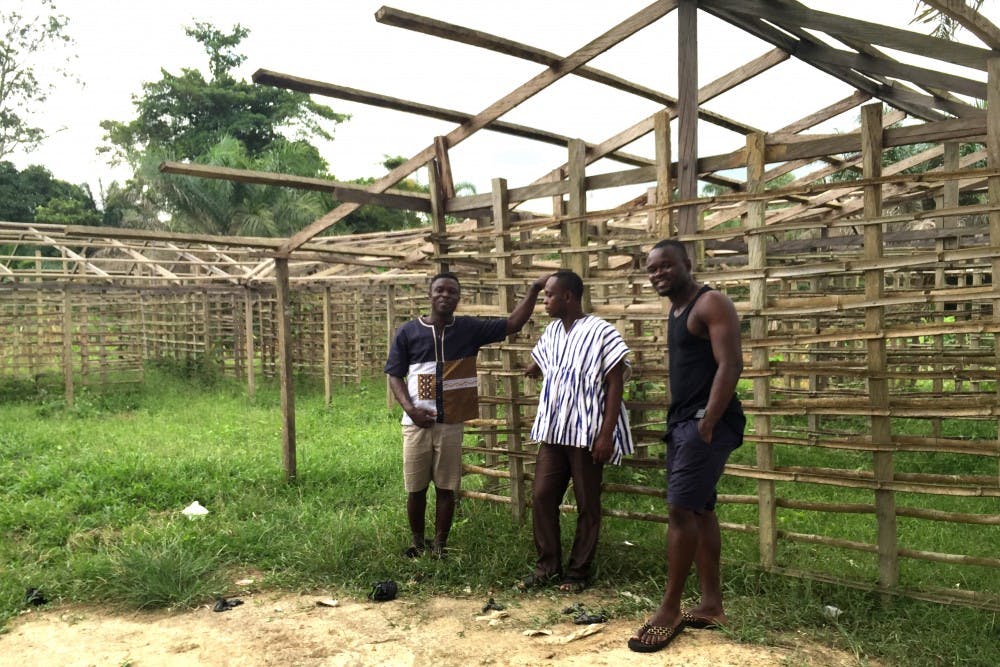
Shadrack Frimpong (left) standing alongside a work-in-progress building that is a part of his project to bring Tarkwa Breman a model school for girls and a community clinic. | Courtesy of Tarkwa Breman Community Alliance
Growing up in Tarkwa Breman, a region in western Ghana, 2015 College graduate Shadrack Frimpong noticed that many of his female peers, seen as second-class citizens in the community, would stop going to class. Frimpong had also witnessed many of his friends and family suffer from diseases such as HIV/AIDS and Hepatitis B. To receive treatment, the closest comprehensive medical clinic was 150 miles away.
With the President’s Engagement Prize he won in spring 2015, Frimpong is now working to solve these problems of education and healthcare inequality in his home village.
The President’s Engagement Prize was started by Amy Gutmann to give Penn seniors the ability to design and lead a local, national or international project after they graduate. The prize was awarded to Frimpong in 2015 in order to build the Tarkwa Breman Model School for Girls and Community Clinic.
“I have enjoyed seeing people’s excitement in the community,” Frimpong said. “I see hope in the girls’ eyes and their parents’ eyes because they can see a brighter future for their family and community.”
Frimpong and the Tarkwa Breman Community Alliance will create a school that will hopefully educate 200 girls between the ages of five and 17, as well as a community clinic with consultations rooms, a pharmacy, a dressing/injection room, a laboratory, a delivery room, an on-call hospital room and a farm that students’ families will be responsible for cultivating once a week as a payment for their daughters’ education.
Professor Richard Wesley and lecturer Scott Aker from the School of Design’s Department of Architecture, along with their students in the undergraduate program, proposed design drawings for the school and clinic. They plan to visit the village to join Frimpong, a local architect and the community in building the structures.
“In the United States, a project is sustainable if it is LEED-certified. However, we are trying to take sustainability to the next level,” Aker said. “We are looking at this community as an agrarian society. The farm will provide an income by selling cash crops and will also provide healthy food for the students. It’s a more holistic form of sustainability.”
Frimpong and his team have worked with local leaders in the village to obtain knowledge of the area, develop trust with members of the community and make the project sustainable. The village’s chief has already donated 50 acres of land to Frimpong’s project leaders so construction on the school can begin.
Along the way, however, there have been challenges.
When surveying the land they secured, Frimpong’s team came to the realization that a river running through the village, the Ankobra, had been severely polluted due to illegal gold mining. However, the Community Alliance partnered with the nonprofit Clean Water for Everyone to build two boreholes to provide clean drinking water. Through the many obstacles, the team remains motivated.
“There can be many obstacles but what keeps us motivated is remembering why. Why are we doing this?” Frimpong said. “Because we want to transform the rural community to be self-sustainable. We believe that basic healthcare is a basic human right. We want to send a message to the world that girls have so much potential when they are able to get an education. Because human lives are on the line. ”
The goal is to open the facilities by September 2016.
“Everyone believes in this project and Shadrack; from the University, to the Penn senior architect students working on the project, to the local villagers,” Aker said. “This a recipe for a successful project.”
The Daily Pennsylvanian is an independent, student-run newspaper. Please consider making a donation to support the coverage that shapes the University. Your generosity ensures a future of strong journalism at Penn.
DonatePlease note All comments are eligible for publication in The Daily Pennsylvanian.




